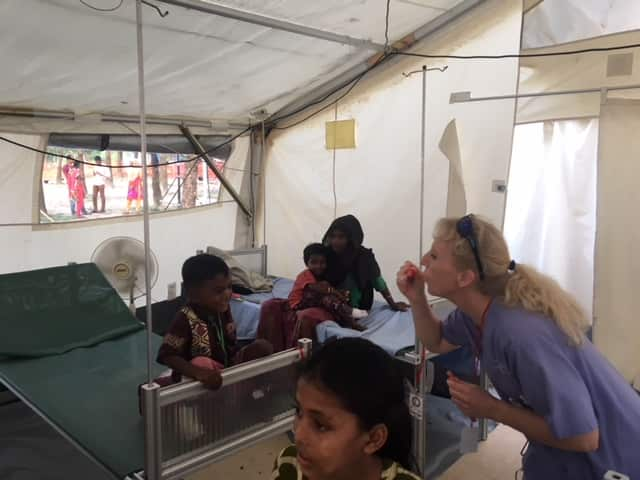Amongst the rubber trees of a Bangladesh forest lies a hospital made from white tents. It is the only medical facility in the area. The next hospital is a two-hour drive away.
Since the field hospital was set up by the Red Cross six weeks ago, medical staff have seen at least 200 outpatients every day.
The most common admissions are pneumonia, malnutrition and worm infections. But doctors fear a measles outbreak is looming.
When SBS News visits, two new tents have to be erected overnight to house 17 new patients, but many are returning to the camps against medical advice. There are three wards for seriously ill patients who need to be admitted, as well as a maternity ward, an X-ray facility and a tent for psychology services. But the main feature is a surgical ward, where the one or two resident surgeons perform a dozen lifesaving operations a week.
There are three wards for seriously ill patients who need to be admitted, as well as a maternity ward, an X-ray facility and a tent for psychology services. But the main feature is a surgical ward, where the one or two resident surgeons perform a dozen lifesaving operations a week.

Medical staff blow bubbles to cheer up kids in the children’s ward. Source: Kirsty Johansen / SBS News
One of the patients in the women's ward was 25-year-old Hafeza Khatun. When SBS spoke to her family she was so weak and had not been able to eat properly for more than two months. Her mother, Halima Khatun, said her daughter had developed a huge abscess in her abdomen while crossing the border and her body was now shutting down.
Her mother, Halima Khatun, said her daughter had developed a huge abscess in her abdomen while crossing the border and her body was now shutting down.

Hafeza Khatun, 25, with her mother, Halima Khatun, at the hospital in Bangladesh. Source: SBS
"I don't know what she drank, maybe urine water, maybe toilet water. Because of this she is now suffering," her mother told SBS News.
Pereta Vapre, the only surgeon on duty, made her case a priority.
"Her condition is quite bad I think and in this context, it's a huge problem that wounds they don't heal properly," Dr Vapre said at the time.
Ms Khatun was rushed into surgery to drain the abscess and clean the area. It is normally a simple procedure but the team find out it is even worse than they originally thought.
"We found the hole which goes deeper and now there is risk that the infection spreads deeper," Dr Vapre said.
They decide not to operate further with fears her already frail body will not be able to cope.
Her mother said she has already lost two children and was petrified she is going to lose another.
Sadly Ms Khatun died shortly after SBS heard her story.
Australian Red Cross aid worker Mike Denison says the team are always ready to go as no one knows when the next influx of refugees is going to arrive.
"We opened to a huge demand and this meant that we weren't quite set up. We weren't sure what we were going to see. But now it's running a lot smoother," Mr Denison says.
In the children’s ward nurses entertain the young patients, trying to take their minds off their horrific injuries.
Nur Hashim, nine, is lucky to be alive. He was almost killed by the Myanmar military. His brother and uncle were shot in front of him. But if that was not enough, as he continued his journey to Bangladesh he was trampled by an elephant.
But if that was not enough, as he continued his journey to Bangladesh he was trampled by an elephant.

Nur Hashim, nine, with his 18-year-old brother, Abdul Hafez. Source: SBS
"The elephant came suddenly behind me. When I saw the elephant I jumped and the elephant was running and he stood on me," Hashim said.
"I was so afraid. When the elephant attacked me I was in so much pain."
With two broken legs he still manages a smile, despite having months of recovery ahead of him.
Save the Children is one of several charities involved in an emergency joint appeal to help people fleeing violence in Myanmar. All donations to Australia for UNHCR and The Australian Red Cross will be matched by the Australian Government. View a list of all the charities taking part and how you can help in the link below.
HOW YOU CAN HELP

How you can help Rohingya Muslims fleeing violence in Myanmar




